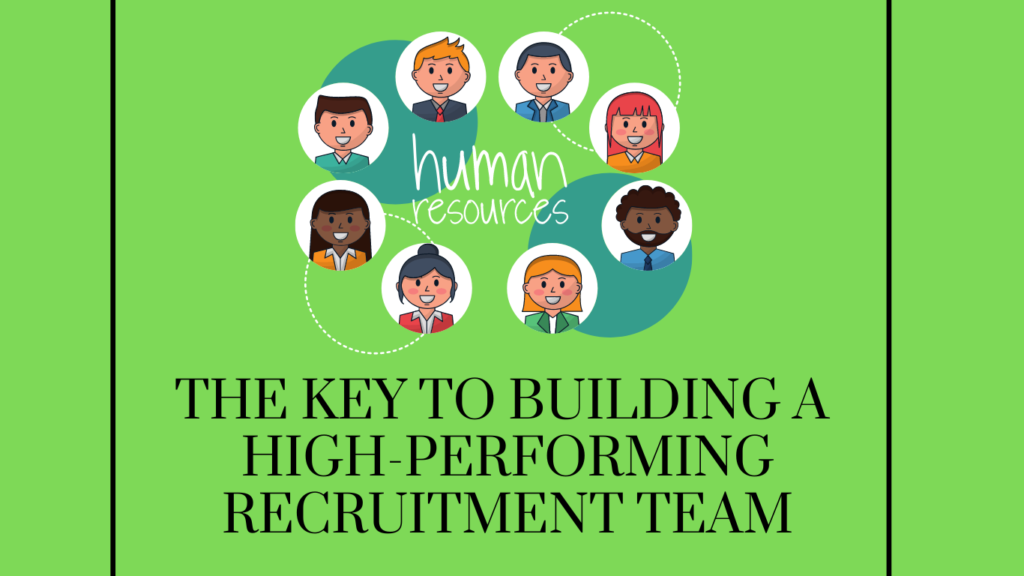Building a Recruitment Team

Building a high-performing recruitment team is crucial for any organization looking to succeed in today’s competitive job market. A team that can attract, retain, and develop top talent is crucial to achieving business objectives and staying ahead of the competition. However, building such a team requires more than just hiring talented recruiters and hoping for the best. It requires a deliberate approach that involves identifying the right skills, setting clear goals, and nurturing a culture of excellence.
If you’re looking to build a high-performing recruitment team, keep reading. In this blog post, we will explore the key skills required to build a successful recruitment team, and provide practical tips on how to create a culture of excellence within your team. So, if you are looking to build your team, this post will provide valuable insights and actionable steps to help you achieve your goals.

Recruiting is a critical function in any organization. It involves identifying, attracting, and hiring the right talent for a specific role. The art of recruiting is all about finding the perfect match between the job requirements and the candidate’s skills, experience, and personality traits. It requires a deep understanding of the job market, the industry, and the organization’s culture.
Recruiters are the professionals responsible for this process. They are the ones who source, screen, and interview candidates, negotiate salaries, and onboard new hires. They act as the intermediaries between the candidates and the hiring managers, ensuring that both parties are satisfied with the outcome. Recruiters must have excellent communication skills, a strong network, and a deep knowledge of the industry to succeed in their roles.
Why Do You Need a Strong Recruitment Team?
A strong recruitment team is essential for any organization that wants to attract and retain top talent. The recruitment team plays a crucial role in ensuring that the right people are hired for the right job. Here are some reasons why you need a strong recruitment team:
- Attracting Top Talent: A strong recruitment team is skilled in identifying and attracting top talent. They have the knowledge and expertise to create compelling job descriptions, advertise job openings effectively, and use social media and other channels to reach the best candidates.
- Retaining Top Talent: A strong recruitment team not only attracts top talent but also works to retain them. They understand the importance of employee engagement, job satisfaction, and career growth, and work to create an environment that supports these factors.
- Managing the Recruitment Process: Recruitment involves a lot of paperwork, documentation, and coordination. A strong recruitment team manages the entire process efficiently, from posting job listings to conducting interviews, making job offers, and onboarding new hires.
- Ensuring Legal Compliance: Recruitment involves compliance with various legal requirements, such as equal employment opportunity laws and data privacy regulations. A strong recruitment team ensures that the organization is compliant with all relevant laws and regulations.
Who Do You Need on Board for Your Recruitment Team?
To build a successful recruitment team, you need to consider the following roles:
Head of the Human Resources Department
The head of Human Resources plays a crucial role in a recruitment team. This person oversees the entire recruitment process, from identifying staffing needs to assess and give the hiring packages for the new employees. Here are some specific responsibilities and functions of the head of Human Resources in a recruitment team:
- Develop recruitment strategies: This person is responsible for developing recruitment strategies that align with the organization’s goals and objectives. This involves identifying the most effective recruitment channels, such as job boards, social media, and employee referrals.
- Manage the recruitment process: As well, he/she manages the entire recruitment process, from creating job descriptions to extending job offers. This involves coordinating with hiring managers, scheduling interviews, and conducting background checks.
- Ensure compliance: The head of Human Resources ensures that the recruitment process complies with legal and regulatory requirements. This includes ensuring that job postings are non-discriminatory, background checks are conducted in accordance with applicable laws, and all required documentation is maintained.
- Build relationships with candidates: The Head of Human Resources is responsible for building relationships with candidates and ensuring a positive candidate experience. This involves providing timely communication, answering questions about the organization and the role, and providing feedback to candidates.
The head of Human Resources is critical to the success of a recruitment team, ensuring that the organization attracts and hires the best candidates while complying with legal and regulatory requirements. Check the job description for this position here.
Talent Sourcer
The talent sourcer is a crucial member of the recruitment team, responsible for identifying and engaging with potential candidates for open positions.
This role involves a combination of research, networking, and outreach to build a pipeline of qualified candidates for the recruiting team to consider. Here are some specific responsibilities of a talent sourcer:
- Research and identify potential candidates through a variety of sources such as job boards, social media, and professional networks.
- Screen and assess candidates based on job requirements and qualifications to determine their fit for the position.
- Engage with potential candidates through various communication channels such as email, phone, and social media.
- Build and maintain a talent pool of qualified candidates for future recruitment needs.
- Collaborate with recruiters and hiring managers to understand job requirements and provide recommendations for potential candidates.
- Utilize data and analytics to measure the effectiveness of sourcing strategies and make data-driven decisions.
This is a critical role in the success of the recruitment team by identifying and engaging with top talent to fill open positions.
Recruiter
This role gets confused with the talent sourcer, but they are not the same!
While the recruiter focuses on the entire hiring process, the talent sourcer’s role is to proactively seek out potential candidates for future job openings. Here are some differences between the recruiter and the talent sourcer:
- Recruiters are responsible for the entire hiring process, while talent sourcers focus on sourcing candidates.
- Recruiters are often involved in the initial screening and interviewing of candidates, while talent sourcers typically do not conduct interviews.
- Recruiters work closely with hiring managers to identify job requirements and assess candidates’ fit, while talent sourcers may work independently or with a smaller team.
Below, you got an image to help you to distinguish both roles:

Recruiters are mainly responsible for:
- Reviewing and analyzing resumes and cover letters to determine if candidates meet job requirements
- Conducting initial phone screenings to assess candidate qualifications, experience, and interest in the position
- Coordinating and scheduling interviews with hiring managers and team members
- Conducting in-depth interviews with candidates to assess their skills, experience, and fit with the company culture
- Checking references and verifying employment history of potential hires
- Negotiating job offers and coordinating the onboarding process for new hires
- Maintaining applicant tracking systems and other recruitment databases to ensure accurate and up-to-date information on candidates and job openings.
Hiring Manager
A hiring manager is a person responsible for managing the recruitment and selection process of qualified candidates for a job opening within an organization. They work closely with human resources and other departments to identify the most suitable candidates for the job.
It’s important to note that the hiring manager is mostly responsible for filling positions within their specific department, while the head of Human Resources oversees the entire hiring process for the organization.
- The hiring manager has a more hands-on role in the hiring process, including conducting interviews and making the final hiring decision, while the head of human resources is typically more involved in creating and enforcing hiring policies and procedures.
- The hiring manager is often more focused on the specific needs and goals of their department, while the head of human resources is responsible for ensuring that the organization as a whole has the talent it needs to succeed.
Employer Branding Specialist
An employer branding specialist is a key player in any recruitment team. This professional is responsible for creating and executing strategies that promote the company’s brand and values to attract top talent. They also work to create a positive candidate experience throughout the recruitment process.
This professional must have a deep understanding of the company’s culture, values, and mission. They must be able to articulate these values in a way that resonates with potential candidates. They also need to be skilled in creating compelling content that showcases the company’s brand and culture.
An employer branding specialist is in charge of:
- Developing and implementing recruitment marketing strategies that attract top talent. This includes creating job postings, developing social media campaigns, and building relationships with industry influencers. They must also be able to measure the success of these campaigns and adjust their strategies accordingly.
- Creating a positive candidate experience throughout the recruitment process. This includes ensuring that candidates are treated with respect and that their questions and concerns are addressed in a timely manner.
- Working to ensure that candidates have a clear understanding of the company’s culture and values, and that they are excited about the opportunity to work for the organization.
This professional is responsible for promoting the company’s brand and values to attract top talent, as well as creating a positive candidate experience throughout the recruitment process. Their role is essential to building a strong and engaged workforce.
Data Analyst
In addition to tracking recruitment metrics, a data analyst in the context of recruitment may also be responsible for managing and maintaining recruitment databases, conducting research on industry trends and best practices, developing and implementing data-driven strategies to improve recruitment outcomes, and collaborating with other stakeholders in the recruitment process to ensure alignment and success.
They may also be responsible for creating and presenting reports and visualizations to communicate data insights to stakeholders. Overall, the role of a recruitment data analyst is to leverage data to inform and improve recruitment decision-making and outcomes.
Diversity and Inclusion Specialist
This position is fairly new as diversity and inclusion as with the growing awareness of the benefits of having a diverse workforce, many companies are now seeking to hire professionals who can help them create an inclusive environment that values and respects all employees.
A diversity and inclusion specialist is a professional who works to create a more diverse and inclusive workplace, promoting equity, and addressing issues related to discrimination, bias, and prejudice. The specialist is responsible for creating a welcoming workplace culture that encourages diversity and promotes inclusivity. They are tasked with developing and implementing strategies that attract and retain a diverse range of candidates, including those from underrepresented groups.
Bringing Together Each Role: Harmony in the Recruitment Team
You got your team complete, now how do you do for all of them to work cohesively? To ensure a high-performing recruitment team, here are some tips and best practices:
- Clearly define roles and responsibilities: Each member of the recruitment team should have a clear understanding of their role and responsibilities. This will help to avoid confusion and ensure that everyone is working towards the same goals.
- Establish communication protocols: Effective communication is essential for a high-performing recruitment team. Establish regular check-ins, meetings, and channels for communication to keep everyone on the same page.
- Encourage collaboration: Encourage members of the recruitment team to work together and share ideas. This can help to generate new ideas and approaches, and can lead to more effective recruitment strategies.
- Focus on candidate experience: A high-performing recruitment team should be focused on providing a positive experience for candidates. This can include timely communication, transparency throughout the recruitment process, and personalized interactions.
- Use data and metrics: Support yourself on your data analysis team! Utilize data and metrics to track the effectiveness of recruitment strategies and identify areas for improvement. This can help to optimize recruitment processes and ensure that the team is working as efficiently as possible.
- Continuous learning and development: Encourage members of the recruitment team to continually learn and develop their skills. This can include attending training sessions, participating in industry events, and staying up-to-date with the latest recruitment trends.
By implementing these tips and best practices, a recruitment team can work together in sync and achieve high levels of performance.
Bottomline
A high-performing recruitment team plays a crucial role in the success of any organization. By identifying and attracting top talent, they ensure that the company is staffed with the right people to achieve its goals. To build such a team, it’s important to focus on communication, training, and a clear understanding of roles and responsibilities.
With a strong recruitment team in place, organizations can expect to see improved hiring outcomes and better business results. Take action today to invest in your recruitment team and watch your organization thrive.
-The Monitask Team


